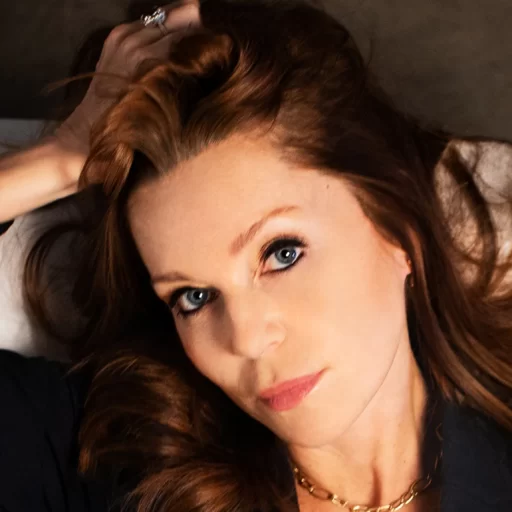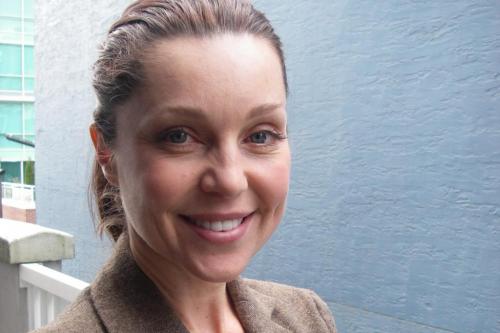Interview with The Vancouverist - The Talented Sarah-Jane Redmond
Originally published February 2010 by The Vancouver Observer, then published at The Vancouverist.com, Wendy Dalliar interviewed Canadian actor Sarah-Jane Redmond about aspects of her career and her latest projects in Theatre, Cinema and Television.
SarahJaneRedmond.com expresses its thanks to Wendy Dallian, the Vancouver Observer and The Vancouverist.
The Vancouverist talks with local actor Sarah-Jane Redmond about her journey in the film and theatre industry.
tV: I’d like to talk about you and your background and how that led into you becoming an actor.
SJR: I don’t remember ever making the decision to becoming an actress. It was just a thing that I was going to do. I remember my mom telling me that when I was five years old she came home from work to find me crying. I had the phone book open and couldn’t find actress (laughs).
I studied dance for eight years in Toronto and made the transition of going to theatre school. I was going to go to RADA (Royal Academy of Dramatic Arts) in England and I actually made the trip over but ended up just travelling for the year and having a great time. I came back and went to the William Davis Centre for two years.
I think that everybody finds their teacher and Bill Davis for me really worked. He didn’t have to say very much and just seemed to know how to help me find my way in terms of learning what it took.
The thing that wasn’t in the schools in 1991, was film and television. So when you trained to be an actor you training was focused on relationships and listening; the fundamental things that are so important and which you miss a lot of when you’re taking just film and television. With film and television a lot of times you start from external points and it can be difficult to work backwards, if that makes sense. So although there wasn’t a lot of film and television technical aspects taught in the school, it gave me all the fundamentals.
Once I graduated I found myself just sitting around and it didn’t feel right. I didn’t want to just wait around to get a job, so I started a theatre company called the Holy Barbarians. We named ourselves after the Beat Generation, which were a group of writer in the fifties. Holy in our search for truth and self and Barbaric in our rejection of the so called standards of civilized success, morality, and neurosis (laughs). It was a lot to fulfill (laughs).
I had no idea what I was doing. It was one of those things where you jump into something and you think, looking back, had I known how much work it was going to be, but I threw myself into starting a theatre company and learned through trial and error. We did about three or four plays. There was a great group of actors; Lori Triolo, Ben Ratner, Frank Cassini, and I think John Cassini. I really wanted to work with these guys and so I found a great play called The Red Address, by David Ives, and it was fantastic. We did that for The Fringe Festival and I ended up getting Lisa Kirk as an agent.
I was signed up for film and television work and it was kind of a rough go for me the first couple of years because I didn’t really know what I was selling. I thought “I’m an actress and I can do everything” and I didn’t really have a specific look or package I was selling. I’ve discovered how important it is to fine tune what you’re selling, and then you can branch off and people discover that you can do all sorts of things.
For me what really helped was marketing myself. I discovered that what I can sell myself as, is femme fatale. I changed my look and started marketing myself as that, and that’s when it started to open up for me. I took matters into my own hands and would send packages out to people. Some of them worked. It was a matter of being pro-active as opposed to sitting around waiting for the phone to ring. I think that’s been gold for me, in all aspects of my life, but especially in my career.
tV: What kind of projects did you get involved with initially?
SJR: The first ones were literally “he went that way”, you know, the one line thing.
I’d be sitting in a trailer not know whether someone was going to come and get me or if I had to go and find them. They’d say stand on your mark, and I’d say what’s a mark, all that sort of stuff. I had no idea what I was doing but you pick it up.
So I started off doing one liners and then I discovered how to market myself and got smart about my business skills, found some of the people I wanted to work with in the industry and pursued working with them. I was very focused about what I wanted and where I wanted to go, and things just shifted quite suddenly.
tV: Who’s been one of the most exciting people you’ve worked with?
SJR: As an actor, probably Lance Henriksen.
I was wondering what I was doing in film and television. It was only a couple of years into it but it wasn’t what I went to theatre school for, it wasn’t exciting, I wasn’t getting that… it was exciting to be on set, but when you were actually in front of the camera working with another actor, a lot of the times there was no connection. There’s none of that sense of play and finding different things to work with, and so I thought well maybe I should just stick with theatre. That, to me, gave this sense of being alive.
Then I got a job working with Lance Henriksen. It was really exciting job. I had an out of body experience I was so nervous. It was a really demanding role and I thought, how am I supposed to stand up to Lance Henriksen. I had to really walk circles around him. It was like a cat and mouse and I had to really be in my power and I thought, I don’t know if I can do this. Something happened and I got there, and it just worked.
Back when I was smoking cigarettes, Lance and I would stand outside the studio and be so excited and talking about what we could do, and it just ignited this sense of, wow, ok so this can happen in front of the camera as well as on stage, this sense of play and electricity can happen in front of the camera.
Two others who were big influences for me were Chris Carter and Terry O’Quinn.
tV: Can you tell us a little about what you’re working on now?
SJR: I just finished a film called Murder Among Friends in Victoria. It was wonderful. I got to work with my old friend Venus Terzo who I worked with on Da Vinci’s Inquest. She’s so fantastic, a great lady and great actress. Susan Hogan is in it as well.
We’re mainly Canadians, which is unusual, and women in their late thirties early forties, which is also unusual, it was already quite a unique experience. And the the fact that we all got along really well was another bonus. It was a great project, very unique in having the whole cast women in their thirties and forties.
The producers were wonderful and I just did some ADR(voice overs) and it looks really good.
I’m also working on The Vagina Monologues in March at the Massy Theatre. I’m also working on a film through the Crazy 8 Film Festival. Todd McCoy has written a piece and they just made it down to the finals so they’re just waiting to find out if they’ve won one of the spots that will allow them to make the film. They’ve asked me to be a part of that, and to play the lead in their film.
Auditions have slowed down a little bit because of the Olympics, but I had a really busy year last year and I think this is going to be a great year too.
tV: With the projects you’re working on now, are there any we can expect to see in theatres or at festivals?
SJR: Yes, I’m in a film called 30 Days of Night 2: Dark Days. And Grow The Big One. Murder Among Friends (later known as Lies Between Friends) will be coming out in the fall. If you go to my website you can find more information about that.
You mentioned that the industry was slowing down right now and that you were part of a film that was largely Canadian. Six out of the seven women in the film were Canadian. That’s really big for the industry here. Can you see that shifting at all? Is that becoming a more positive thing for Canadian actors?
I like to stay really positive. I like to think that there’s lots of work out there, that there’s lots of work for everybody and that there isn’t a shortage and that I’ll continue to work. I find if I get my finger on the pulse and I start hearing that it’s going to slow down, then I start to buy in to that a little, whether it’s true or not. I just focus on getting work.
tV: What is the project that you’re most proud of?
SJR: That’s a challenging question because there are so many different reasons why you like a project. I think Alienated was a great experience. I thought the writing was phenomenal and we were laughing all day long. It was so fun to be on that show, everybody was having a great time. It’s something that I would watch so I’m really proud to say I was part of that. And Da Vinci’s was so well respected. To be a part of that sort of feels like being a part of BC’s film and television history.
tV: Can you tell us what’s in the future for you. What are your hopes and plans?
SJR: The most important thing to me is my son. He comes first and foremost. The great thing about film work is that it affords you time to be with your family. You can work for a period of time and then you have lots of time off to be with your family.
The one area that I haven’t tapped into is the independent filmmakers. I had a great experience on The Entrance and that was wonderful and positive, but I’ve done mostly American projects. I’d love to work with some of the independent filmmakers in Canada.
I think getting a recurring role on a series is great because it affords you time off to be a mom.


